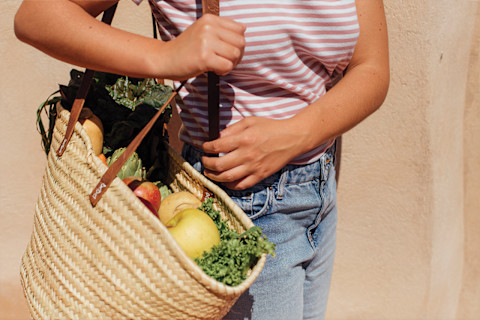We Need A More Sustainable Food System. What That Means & How To Help

Do you know the story behind the food on your plate? Few of us do. Beyond an "organic" or "local" sticker, that information is actually pretty hard to find. But the reality is, there is an entire food system in place making it possible for you to stock up your kitchen or grab that quick bite on the go. And this modern system may be convenient in the moment, but is it sustainable in the long run?
A sustainable food system.
Short answer: no. For years our modern food system has valued quantity over quality, which has snowballed into standardized practices that don't nourish our longevity or the planet's. From food waste to soil erosion to the regular use of pesticides and harmful chemicals, a more sustainable food system sits at the top of our collective to-do list. But what does that actually look like? And more importantly: How can we each make a difference? Well, the solution might be easier than you think, and it starts with what you choose to eat.
As the popular Helen Keller quote goes, "Alone we can do so little; together we can do so much." Choosing food brands with sustainable initiatives is a way that we, as individuals, can harness that power of working together. One such brand is Daily Harvest, a food company delivering the power of plant-based ingredients to your doorstep. With Daily Harvest, you're not just enjoying a Mint + Cacao Smoothie, you're helping build a sustainable food system one sip at a time. And let's talk about what that looks like.
More fruits and vegetables
There are a lot of components of a sustainable food system—but one of the simplest is eating more fruits and veggies (FNV). As it stands, 14.5% of the greenhouse gas emissions caused by humans is related to global livestock, i.e., eating meat. That doesn't mean we all have to go vegan, but a 2018 study1 confirmed that eating more FNV is associated with a lower environmental impact. Just by eating more plants, we can reduce our carbon footprint by a third2! From all angles, a sustainable food system involves a fruit-'n'-veggie-centric diet. Daily Harvest has recognized this truth and made it easy to do exactly that.
Whether it's their plant-based Smoothies, Flatbreads, or Harvest Bakes (with gourmet feels), Daily Harvest makes our plant quotas convenient and delicious. In a world where busyness reigns supreme, simply throwing a Chickpea + Coconut Curry Harvest Bake into the oven for hearty veggie goodness feels too good to be true—and yet, it's not. Fruits and veggies have never been more important, but they're not the only factor in a more sustainable food system.
Sustainable farming practices.
Many of the greatest challenges embedded within our modern food system originate on the farm, where short-term agricultural gains are creating long-term problems. For example, chemical fertilizers and pesticides may yield more output, but they can also be toxic to humans3 and harm our soil for future harvest. And industrial agriculture may feed higher numbers via commodity grains like maize, corn, and wheat—but these "cereal crops" are not the nourishing foods our bodies need. On top of that, small farms (which make up 72% of all farms) are gradually disappearing, in part because of corporate agriculture's initiatives to produce at scale.
Thus, a more sustainable food system also starts on the farm, which is exactly why healthy soil, synthetic-free crops, and empowered farmers are at the heart of Daily Harvest's every decision. Sustainable farming practices hold a lot of promise, not just for our individual health, but the planet's. Here are a few of them:
Cover cropping: This natural process entails planting for the sake of covering the soil, versus harvesting. Cover crops have been proven to benefit soil health, increase crop yield, and control pests and diseases naturally.
Organic pest control: Organic farming uses natural pesticides4 like animal byproducts or mined minerals instead of synthetic chemicals like glyphosate. This doesn't just support the health of our soil, it means fewer chemicals making their way into our food, water, and bodies. Beneficial not just for us, but for the people who grow our food and surrounding communities.
Biodiversity: Agricultural biodiversity is defined5 as "the variety and variability of animals, plants, and microorganisms that are used directly or indirectly for food and agriculture." In terms of farming, biodiversity is known to improve soil health, yield more nutrient-dense foods, and strengthen ecosystems5.

Choose sustainable foods.
On the surface, there are many concerning facts about our modern food system. But the way we see it, this system is in an era of inspiring change. And it's only natural to ask, how can I help? At the most basic level, we can make a genuine difference by being mindful of the foods we choose: by eating our FNV, and supporting brands with sustainable practices in their DNA. And that choice can be as refreshing as a Daily Harvest Acai + Cherry Smoothie or as mouth-watering as a Kale + Sweet Potato Flatbread. We may have a long road ahead, but who said the journey can't be delicious?
5 Sources
- https://www.ncbi.nlm.nih.gov/pmc/articles/PMC5811770/
- https://www.nature.com/articles/s43016-021-00343-4
- https://www.who.int/news-room/questions-and-answers/item/food-safety-pesticide-residue
- https://www.sciencedirect.com/topics/engineering/natural-pesticide
- https://www.sciencedirect.com/topics/agricultural-and-biological-sciences/agricultural-biodiversity




